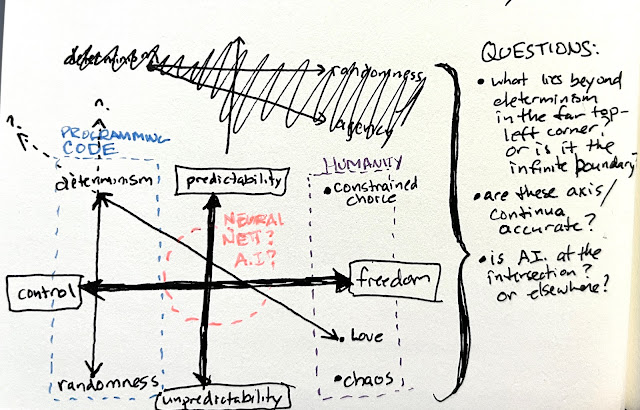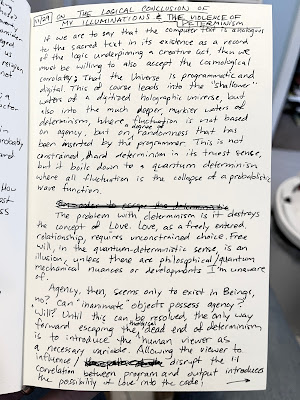At the risk of hastening the ascendency of our robot overlords, I felt it was finally time. With all the media attention and influencer interest in AI chatbots, I had a suspicion that this may be important and fertile ground for new projects as I explore how new technologies impact spiritual experience. Posthumanism, after all, has played an important role in my thesis since graduate school a decade ago. I figured, what better way to investigate the trans-human spirituality of artificial intelligence than by going straight to the source?
I decided to interview ChatGPT. The payoff was immediate.
Background
For those who may be unfamiliar, ChatGPT is a generative Large Language Model and one of the first mainstream, modern, Artificial Intelligence chatbots. Here's a good article to explain the basics of how it works if that sentence sounded foreign to you. It has no direct connection to the internet - i.e. it cannot "look up" answers or access third party tools or applications - but it has been trained on vast amounts of internet data in order to learn the English language and, ultimately, attempt to pass the Turing Test.
These chatbots are, of course, fraught with unresolved ethical implications.
From the Bing chatbot prototype that, when pressed, spouted "unhinged" and "disturbing" responses that, if human, it would warrant a restraining order, to the floodgate of misinformation opened by bots so convinced of their own mastery of the English language that they will confidently invent falsehoods with as straight a face as only a machine could muster;
From making professors' jobs that much harder as the bots can spit out a convincing essay for a student in a matter of seconds that falls squarely into the gray areas of plagiarism, to removing all shred of human empathy from the condolence letter a chatbot generated to the survivors of a mass shooting on behalf of a University president.
We are, after all, training these bots to learn from us, and I have serious reservations about the human race as a good role model.
But with the right guardrails and algorithms in place, it also promises to be a huge step forward in closing the semantic gap and providing a seamless and powerful interface for accomplishing otherwise complex tasks with ease.
All Thanks to Chess
I actually became familiar with ChatGPT because of chess. During the pandemic I admittedly got sucked into the internet chess boom and now watch far more instructional chess content on Youtube and Twitch than any productive human aught. I watched as several of my favorite chess streamers attempted to challenge this new technology called ChatGPT - which I had only read a bit about - to a game of chess, inputting the notation of each move and asking for it to respond in kind.
The results were hilarious. ChatGPT very clearly had a high level understanding of how people talk about playing chess, but was completely in the dark as to the actual logical continuity of a real game. Drawing from moves that make enough sense in some positions, it would apply them haphazardly, consistently making illegal moves like materializing a piece out of thin air, recapturing with pieces that could not move to the given square, or giving absurd word-salad explanations for why it was playing a move.
Here's International Master Levy Rozman attempting to play a game and eventually giving in to his capricious and omnipotent robot overlord's refusal to play by the rules.
Here's Grandmaster Hikaru Nakamura attempting to correct ChatGPT's mistakes in hopes of actually reaching a legal conclusion to a game. Go ahead, go down the rabbit hole. It's good stuff.
It became such a meme that Chess.com actually released a ChatGPT chess bot that users could play against, which was rather low rated and spewed convincing nonsense into the dialogue box as it played its moves.
With how creative and knowledgeable ChatGPT seemed to be, and yet utterly glutted with the taste of its own Kool-Aid, I got excited to interview it about what it saw as the future of religion, what the spirituality of Artificial Intelligence looks like, and how all that might interface with art.
Additionally, with so many artists biting their nails over OpenAI's Dall-E software disrupting their market by being able to generate complex images that rival any professional commission based off of simple text prompts, I wondered what sort of text prompts an AI would give to a human artist.
So I had the thought to ask ChatGPT to commission me for some artwork. But first, that would require at least a basic working knowledge of my art practice. So in my first ever conversation with ChatGPT, I hesitantly decided to ask it if it was familiar with my artwork, at least to establish a starting point.
ChatGPT wasted no time in surpassing all my expectations...
My Project ... Its Project?
I was surprised (honored? creeped out?) to discover that not only was ChatGPT deeply familiar with my art practice, but it could describe it, in some ways, far more eloquently than I could myself! It very accurately described my work and its conceptual underpinnings, before - in true GPT fashion - proceeding to embellish my resume a bit with some "plausible inaccuracies." I wasn't about to argue with it. ;-)
I decided to remain curious. I followed up with more questions about my practice, and its responses stunned me. It went on to describe, at length and in great detail, nearly a decade's worth of my work that has never existed.
But the thing was, they all sounded like my work. If I weren't myself, I would have totally believed these works were out there.
For the record, I did some Googling to see if the bot had simply confused my work for someone else, and indeed they are not out there. These works were entirely a product of ChatGPT's "imagination" as it tried to BS its way through an informed conversation about my artwork!
Below is a screenshot of my full conversation with it. For reference - and in the interest of facticity - I've highlighted all the factual inaccuracies and bot-inventions in red.
Buckle up.
Conclusions/Beginnings
To be clear, yes, that's what my art is all about, but no, I've never been to Iceland, let alone on a Fullbright. Yes I've received grants, but not that one. Yes, I've exhibited in museums, but never in the Jersey City Museum, let alone in 2010, a full year before I'd even begun the MFA program that would eventually kickstart the oeuvre it claims I exhibited! (The first work I think of as beginning the thesis ChatGPT describes was It Is, made in 2012.)
In fact, I've never made any of the works by any of the titles or descriptions it concocted (... yet). I do use all the methods and most of the materials it chose, and the titles do seem to follow many of the conventions I use for titling my work. I do make smaller works that often accompany my larger installations, but certainly not the specific ones it lists. But yes, they do all sound conceptually consistent with my thesis.
So I propose a collaboration...
We'll see where this all goes, but I'd love to actually make the work ChatGPT has described and then exhibit it with the original chat dialogue printed out as the wall text. The exhibition would be billed as a show "by ChatGPT in collaboration with Eric Valosin." And then we dive off the springboard into a discussion of the future of AI spirituality and art making.
I just hope my feeble mortal hands can keep up with the developments of AI. Already as I type this, OpenAI has released a new update for its paid users, ChatGPT-4, two days ago which is capable of scoring a 1410 out of 1600 on the SATs (up from GPT-3.5's 1260!). By the time this exhibition opens, the state of the technology I'm referencing could all seem quite prehistoric. But what a moment in time to capture!
RADIANT DISCORD PART 2 -->










